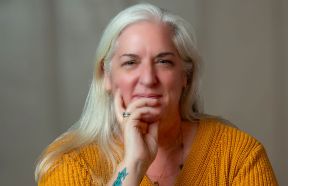| Label | Information |
|---|---|
| Dates & times |
|
| Category | Living Well |
| Age Groups | Adult, Teen |
Saturday, May 4, 2024 Workshop
Start time: 1:00 PM – Duration: 2.5 hours
Location: Wright Library’s Community Room
 There’s more to dying than meets the eye
There’s more to dying than meets the eye
What if you understood more about dying? Had a better sense of what is happening and tools to help? And even with the hard parts you and your family could tap into peacefulness? Join Dr. Martha Jo Atkins, author of Signposts of Dying, for this unique workshop on death and dying that is intended to open space for healing, conversation, and consideration about what it means to be alive. Whether you’re a caregiver, a person facing death, someone grieving a loved one, or thinking about the inevitable future, this workshop is for you.
About the Presenter
Dr. Martha Jo Atkins is a dog-loving, doctoral level (Ph.D.) end-of-life licensed professional counselor and counselor supervisor (LPC-S), coach, speaker and author. For almost thirty years, she’s been working with grieving and bereaved children and families + people at end-of-life and the ones who love them. Learn more at marthajoatkins.com
Q&A with Dr. Martha Jo Atkins
We asked Dr. Atkins some questions about her work, the presentation, and the dying process.
What are some of the most common misconceptions about the dying process?
Dr. Atkins: One misconception is that hospice is really for the last few weeks or days of life. I encourage families to engage with the hospice as soon as they are able. When hospice is called in early, the person who is at end-of-life and their family has an opportunity to build relationships with the hospice staff. That time and relationship building is invaluable. The more the hospice team can learn about the person in their care, the better able they are to help with needs that arise as changes and physical decline start to happen.
Another misconception is that a doctor must make the referral for someone to enter hospice and in fact, a family member, friend, even the person needing care can call and refer themselves. Once the referral is made, a hospice physician will certify the patient qualifies for hospice care.
One last misconception is around medication. I’ve heard from more people than I can count that hospice gives medicines that hasten death. That’s just not true. The medicines given are for symptom relief. When symptoms are relieved and a person’s body can relax, the natural, normal process of a body shutting down can happen, sometimes slowly and methodically, sometimes a bit more quickly.
How do you help people move past discomfort/fear around death, either their own or that of a loved one?
Dr. Atkins: I invite them to talk, to move the energy out of their bodies, to see if they can feel into what’s underneath the discomfort and fear. Many times deep sadness has settled in under fear - sadness at the prospect of losing a loved one and the life imagined, or sadness related to a life-limiting diagnosis and the myriad of things that means. There’s nothing wrong with discomfort and fear. They’re messages for us, clues inviting us into a deeper conversation with ourselves. Discomfort and fear can also serve as signs that it’s time to reach out and connect with beloved others who can be a steady presence as we navigate big life experiences.
What do you hope people will walk away with when they leave the workshop?
Dr. Atkins: After this presentation particularly, I often hear how affirmed audience members feel related to the care they offered their own beloveds. I also hear how they feel empowered to make plans for their lives in ways they hadn’t considered previously. More than anything, I hope audience members will leave feeling the deep and abiding love that can help us through the tender times of being human, especially around the end of life.
What drew you to this work?
Dr. Atkins: I got to do an internship at a level one trauma center in Houston, Texas after college. That internship turned into a second and I found myself on a path to work with children, some gravely sick, some well who were coming to visit someone gravely sick. I had extraordinary mentors who took me in to observe difficult situations so I could learn. I was struck by the fast intimacy the staff had with families, and the families had with each other. There was no room for what didn't matter. I took a job in San Antonio to work in a pediatric ICU as a child life specialist. In the time I was there, my brother Jim died unexpectedly from an undiagnosed heart condition. Before Jim died, I understood end-of-life and grief professionally. After Jim died, I learned about death and grief from the inside out, gaining hard won empathy that allowed me to be present for children and families in a more resonant way. Those professional and personal experiences set me on the path of doing end of life and grief work.
Learn more at marthajoatkins.com
